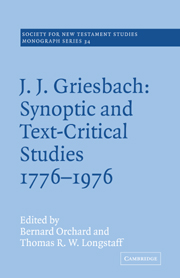Book contents
- Frontmatter
- Contents
- Portrait of J. J. Griesbach
- Copy of Colloquium announcement
- List of participants and selected observers
- Preface
- Abbreviations
- 1 The genesis of the Colloquium
- 2 Johann Jakob Griesbach: his life, work and times
- 3 The Gospel synopsis from 1776 to the present day
- 4 Griesbach's answer to the Synoptic Question
- 5 Commentatio qua Marci Evangelium totum e Matthaei et Lucae commentariis decerptum esse monstratur
- 6 A demonstration that Mark was written after Matthew and Luke
- 7 Griesbach and the development of text criticism
- 8 Modern text criticism and the Synoptic Problem
- 9 At the Colloquium's conclusion
- 10 The Griesbach Hypothesis: a bibliography
- Notes
- Appendix
- Index
5 - Commentatio qua Marci Evangelium totum e Matthaei et Lucae commentariis decerptum esse monstratur
Published online by Cambridge University Press: 23 December 2009
- Frontmatter
- Contents
- Portrait of J. J. Griesbach
- Copy of Colloquium announcement
- List of participants and selected observers
- Preface
- Abbreviations
- 1 The genesis of the Colloquium
- 2 Johann Jakob Griesbach: his life, work and times
- 3 The Gospel synopsis from 1776 to the present day
- 4 Griesbach's answer to the Synoptic Question
- 5 Commentatio qua Marci Evangelium totum e Matthaei et Lucae commentariis decerptum esse monstratur
- 6 A demonstration that Mark was written after Matthew and Luke
- 7 Griesbach and the development of text criticism
- 8 Modern text criticism and the Synoptic Problem
- 9 At the Colloquium's conclusion
- 10 The Griesbach Hypothesis: a bibliography
- Notes
- Appendix
- Index
Summary
Introduction
Johann Jakob Griesbach lived from 1745 to 1812, went to school in Frankfurt and worked as a professor of theology in Halle, moving in 1775 to Jena. His life coincided with a classical period in the history of German literature. Goethe in Weimar was his friend since the years in Frankfurt; Schiller in Jena was even his neighbour in the same dwelling for some years.
Griesbach also lived in a period when modern historical studies of the New Testament began to flourish in Germany, and he was among the pioneers of the critical empiricism which has dominated New Testament scholarship since the nineteenth century. He took over this approach from his main teacher in Halle, Johann Salomo Sender (1725–91). In his scholarly production and university lectures, Griesbach was mainly occupied with New Testament Introduction and Church History. His practical talents and reliable character were the reasons why he was compelled to spend much of his time in Jena on the finances of the university. But his scholarly publications also gave him a great reputation, far beyond the limits of his country.
It was especially the problems of the New Testament text which interested Griesbach, and in this context he gave fruitful impulses to all later New Testament scholarship in three ways: (1) by his critical editions of the Greek text; (2) by his Synopsis; (3) by his Synoptic Theory.
- Type
- Chapter
- Information
- Publisher: Cambridge University PressPrint publication year: 1979
- 1
- Cited by

